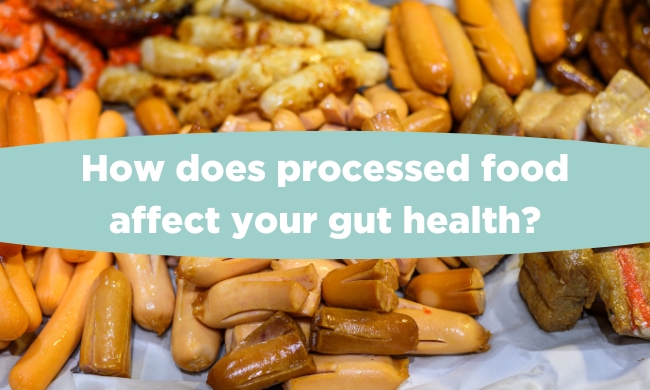In recent years, there has been an increasing amount of conversation in the media and among healthcare professionals on processed food and how it influences our health and wellbeing. In this blog, we explore what processed food is, what it means for our digestive health, and the scientific evidence around the subject.
What is a processed and ultra processed food?
Planning a diet and deciding what foods you should or should not be eating can be confusing due to the overwhelming amount of information presented to us on a daily basis. Foods can be defined as processed or ultra-processed but what does this mean and what is the difference? The NHS definition of a processed food is:
“Any food or drink that has been changed in some way when it’s made or prepared. Most foods we eat are processed in some way.”
Processing food does not mean it automatically becomes unhealthy, in fact, processing foods can actually mean they are safe to eat. For example, milk is pasteurized to kill harmful bacteria, so we are able to drink it or use it for cooking. Therefore, many processed foods are good for our health and diet. However, processing can change the way foods taste, such as adding salt or sweeteners, or preserving it so that it lasts longer with additives. When processed foods are linked to their potential for a detrimental effect on our health, it is usually in regard to ultra-processed foods (UPF). So, what is an UPF? The NHS definition says:
“Ultra-processed foods often include ingredients you would not usually have at home, such as preservatives, sweeteners, and emulsifiers.”
Examples of ultra-processed foods include biscuits, fizzy drinks, sweets, chocolate, and some ready meals, and they are often high in calories and saturated fats.
What is the effect of processed foods on our health?
There is evidence to suggest a diet rich in ultra-processed foods influences our overall health. A paper published in 2024 in the British Medical Journal highlights the strong links between the consumption of UPFs and the risk of cardiovascular disease related to mortality, anxiety, and other mental health conditions (1). The paper also noted a steady increase in the purchase of these foods, and therefore their inclusion in our diets. The rate at which these foods are consumed does vary:
“Across high income countries, the share of dietary energy derived from ultra-processed foods ranges from 42% and 58% in Australia and the United States, respectively, to as low as 10% and 25% in Italy and South Korea. In low- and middle-income countries such as Colombia and Mexico, for example, these figures range from 16% to 30% of total energy intake, respectively.”
For a long time, there has been discussion about the link between bowel cancer and the consumption of red and processed meat. This paper concludes that an average level of 76 g/day increases the risk of colorectal cancer and that alcohol was also associated with a heightened risk, whereas fiber from bread and breakfast cereals was associated with reduced risk (2).
It is important to note that some UPFs can be included as part of a healthy diet including baked beans and wholegrain bread. However, these foods are high in FODMAPs which can affect our gut health, particularly for those who are struggling with symptoms of irritable bowel syndrome (IBS) including bloating and diarrhea.
How does processed food affect our gut health?
There are limited studies looking at the effect of processed and UPFs on our gut health, but Whelan et al published a recent review in Nature (3). Within the paper, the authors discuss how epidemiological studies have indicated an increased risk of gut diseases, including inflammatory bowel disease, colorectal cancer, and possibly IBS syndrome due to the consumption of UPFs.
As mentioned above, UPFs often contain additives including emulsifiers, sweeteners, colors, microparticles, and nanoparticles. The review discusses how preclinical studies have determined that these additives can affect the gut, including the microbiome, intestinal permeability, and intestinal inflammation.
Another recent review in Nutrients, also highlights the lack of available research on UPFs and the gut microbiota (4). There are two studies that have each identified an association between UPF consumption and a change in the gut microbiome, an increase in a ‘bad’ bacteria often associated with infections, Prevotella spp. and then decreases in ‘good bacteria’ Lachnospira spp. and Ruminococcus spp. both of which aid digestion.
We have already explored the gut-brain axis connection in previous blogs, and UPFs could affect this interaction. This paper explored this hypothesis, once again there is a lack of studies within this area, but the authors do state that, “data from several studies suggest that food additives might be linked to metabolic diseases and inflammation. They may also alter the gut microbiota composition and microbial metabolites, which potentially affect cognition and behavior.”
It is important to remember everyone’s gut microbiome is unique and so a food that works for you might not do so for everyone else, including an unprocessed food diet. For more information on what foods are good for digestion, probiotics, and FODMAPs, check out other blogs on our Insights Hub. Our OMED Health Breath Analyzer allows you to track foods, symptoms and the levels of exhaled hydrogen and methane in your breath. Purchase yours today.
References
- Lane M M, Gamage E, Du S, Ashtree D N, McGuinness A J, Gauci S et al, Ultra-processed food exposure and adverse health outcomes: umbrella review of epidemiological meta-analyses, BMJ 2024;384:e077310, doi: /10.1136/bmj-2023-077310
- Bradbury K, Murphy N, Key T, Diet and colorectal cancer in UK Biobank: a prospective study, International Journal of Epidemiology, Volume 49, Issue 1, February 2020, Pages 246–258, doi: /10.1093/ije/dyz064
- Whelan, K., Bancil, A.S., Lindsay, J.O. et al. Ultra-processed foods and food additives in gut health and disease, Nat Rev Gastroenterol Hepatol 21, 406–427 (2024). doi: /10.1038/s41575-024-00893-5
- Brichacek AL, Florkowski M, Abiona E, Frank KM. Ultra-Processed Foods: A Narrative Review of the Impact on the Human Gut Microbiome and Variations in Classification Methods. Nutrients. 2024 Jun 1;16(11):1738. doi: /10.3390/nu16111738




